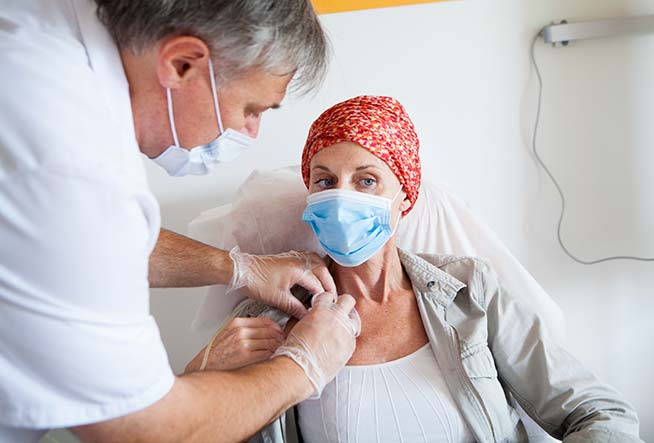5 Ways To Support A Loved One With Cancer

It’s important to be present and supportive towards loved ones with cancer and here are 5 Ways To Support A Loved One With Cancer.
In South Africa, it’s estimated that 1 in 27 women will experience breast cancer, making it the second most common cancer in women of all races, aside from non-melanoma skin cancer. The good news, however, is that advancing early detection methods are helping more and more women discover it in stage one, when it’s extremely treatable. With about 19.4 million South African women aged 15 and up at risk, it’s important to note all the implications of the illness, including hidden costs. That way, friends and family can offer the best possible support to a loved one with breast cancer.
From a financial perspective, breast cancer can cost as much as R1 million, excluding any income lost if the patient is unable to work for a period of time as a result of the illness. Karen Bongers, Product Actuary at Sanlam Personal Finance, says, “In 2017, Sanlam paid out R291 million for severe illness claims and 31% of this amount was paid out for breast cancer. Without cover, cancer can be financially crippling so preparing for the unexpected can help alleviate some of the stress that accompanies the diagnosis.”
A US study has shown that more than two million cancer survivors in that country did not get one or more needed medical services because of financial concerns. South Africans are probably facing a similar scenario, “The expenses can be overwhelming. Aside from treatment, there are so many ‘hidden costs’ associated with the illness – like childcare, petrol, special diets and alternative treatments. That’s why we offer a unique Cancer Benefit that provides additional cover for these expenses, complementing medical aid and gap cover,” says Bongers.
Financial support was an area of key concern for cancer patients and their families, according to research compiled by Sanlam and CANSA last year. 100 cancer patients were asked for feedback on what kind of support they received enough of and what support they wish they’d had more of. This was used to create a ‘support guide’ for family and friends to know how best to support a loved one with cancer. This Breast Cancer Month, here is some of their advice:
The Best Financial Support
- Assuming your loved one has medical aid, gap cover, critical illness cover and income protection in place, there may still be ways for you to financially assist if such cover was at a too low level or not comprehensive enough. The costs of cancer are extensive so even small donations to petrol, airtime, childcare, toiletries and groceries could make a big difference.
- You might be able to help with the admin involved when a loved one lodges a claim to his or her insurer.
- If a loved one has no risk cover of any kind, you may be able to assist by starting a fundraising group.
The Best Psychological Support
- Being strong for someone else is draining, especially when you’re trying to manage your own emotions. Don’t underestimate the toll it will take and look after yourself; take time to reflect and rejuvenate.
- Help your loved one stay positive: cancer is as much a battle of the mind as it is the body.
- Give plenty of compliments and encouragement.
- Arrange counselling if a loved one needs someone outside of family and friends to talk to.
- Provide support for a loved one’s partner and immediate family.
The Best Physical Support
- Keep visits short. Offer to go for regular short walks in pretty places together.
- Understand and accept the implications of chemotherapy on a loved one’s body. Conversely, don’t try and stop a loved one from doing something he/she feels capable of.
- Assist with washing and dressing, depending on the closeness of your relationship – don’t be embarrassed to offer to help.
- Offer to run errands.
- Assist with exercises prescribed by a doctor or physio.
The Best Support Overall
One of the key requests of cancer sufferers is that they do not want to be treated like a patient. This means their family and friends need to differentiate the person from the disease. It’s also important to allow your loved one to talk freely about the disease, and to be open to honest conversations — even if they make you sad or uncomfortable. A willingness to listen and not judge, is also critical. Even if you disagree, decisions are ultimately not yours to make. Gently offer your opinion if it’s asked for, but try to avoid offering unsolicited suggestions like alternative treatments to chemotherapy.
Remember, support is still needed after treatments are finished. Visit Sanlam’s Cancer page for more information on financial cover for cancer.
By Karen Bongers





